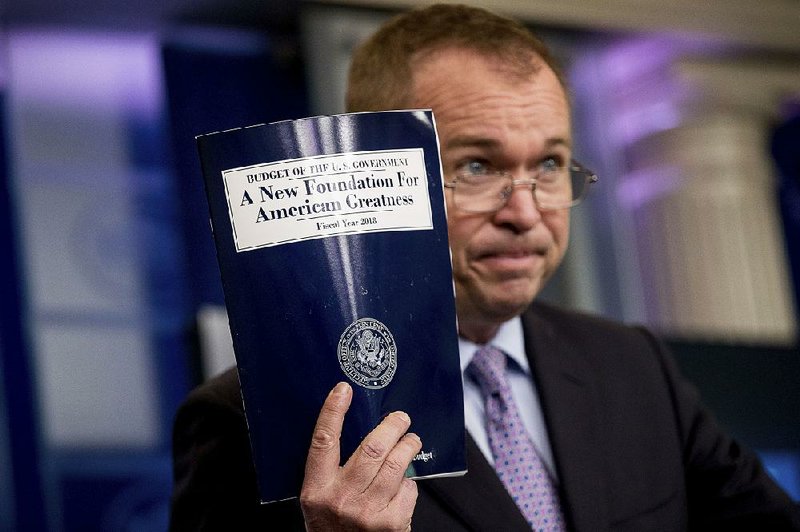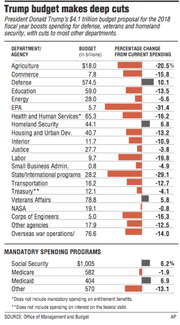WASHINGTON -- President Donald Trump on Tuesday proposed changes in the role of the federal government, issuing a budget plan that cuts back or eliminates numerous programs that the White House says are a waste of money or create too much dependency.
Some of the programs -- including Medicaid and the modern version of food stamps -- provide benefits to up to a fifth of all Americans, and the breadth of the cuts has rattled lawmakers from both parties who have warned that the reductions go too far.
For Trump, his $4.094 trillion budget proposal for the fiscal year that begins in October marks his first exercise in spelling out how he wants the government to change. White House Office of Management and Budget Director Mick Mulvaney called the plan a "taxpayer first budget," and said crafters worked to jettison any spending that they felt they could not defend. In total, that meant roughly $3.6 trillion in cuts over the next 10 years to domestic agencies, food stamps, Medicaid, highway funding, crop insurance and medical research, among others.
The cuts, White House officials said, would usher in a sustained period of strong economic growth that would increase wealth, create jobs and reduce poverty.
"I think what Trumponomics is and what this budget is a part of is an effort to get to sustained 3 percent economic growth in this country again," Mulvaney said in a briefing with reporters.
Funding for Medicaid -- the health care program for low-income Americans and many people in nursing homes -- would be cut by more than $800 billion over 10 years. Funding for the Supplemental Nutrition Assistance Program, a modern version of food stamps that provided benefits to 44 million people in 2016, would be cut 29 percent. In many cases, a higher burden of paying for anti-poverty programs would be shifted away from the federal government and onto the states.
Mulvaney said too many of these programs spend other people's money. He said the government should show "compassion" for low-income Americans, but it should "also ... have compassion for folks who are paying [for] it."
Research programs and environmental protection also would be slashed. There would be a short-term bump in military spending, but even that would flat-line after a few years, all in the quest to eliminate the budget deficit by 2027.
[PRESIDENT TRUMP: Timeline, appointments, executive orders + guide to actions in first 100 days]
The constraints he put on budget writers made it virtually impossible for him to achieve all of his goals, and the data released by his team include numerous assumptions that budget experts attacked as questionable or dubious.
Trump told Mulvaney not to make any cuts in Medicare benefits or the retirement program within Social Security -- two of the government's most expensive line items. To eliminate the deficit, which budget crafters said would reach $842 billion by 2027, they had to make some big cuts.
But they also made some optimistic assumptions about economic growth that many economists -- conservatives and liberals -- said go too far. Trump has proposed cutting the corporate tax rate from 35 percent to 15 percent, but his budget assumes that corporate tax receipts will increase almost every year. The budget says the U.S. government will collect $328 billion in estate and gift taxes over the next decade, but it also says Trump will eliminate the estate tax.
Tuesday's budget release calls for eliminating many of the foreign aid "grants" that the U.S. extends to other countries and replacing them with loans. It aims to make it harder for people to qualify for Social Security Disability Insurance benefits and easier to shift people who receive those benefits to move back into the workforce.
It would essentially crack down on the Consumer Financial Protection Bureau, which was created after the financial crisis, and give Congress more power to limit its budget. It also would cut retirement benefits for people who worked for the federal government.
In agriculture, it would limit subsidies to farmers, including for purchasing crop insurance, an idea already attacked by farm state lawmakers.
It proposes more spending in several areas. It would provide a temporary burst of new defense spending, which White House officials say would allow them to add 56,400 more service members in 2018. It would increase spending on immigration control and border security, and provide another $200 billion for infrastructure projects over 10 years. It would allocate $1.6 billion for the creation of a wall along the U.S. border with Mexico.
"We are absolutely dead serious about the wall," Mulvaney said Tuesday.
Rebukes from some
The proposal drew rebukes, even from some Republican allies, for the plan's jarring, politically unrealistic cuts to the social safety net for the poor and a broad swath of other domestic programs.
"Basically dead on arrival," said the Senate's No. 2 Republican, John Cornyn of Texas.
Democrats immediately attacked the budget plan and vowed to prevent any part of it from becoming law. Republicans hold just a two-seat majority in the Senate, and it is difficult for them to advance major policy changes without support from Democrats.
"These senseless, irresponsible choices serve one purpose: to pave the way for tax cuts for the very wealthiest," said Sen. Sheldon Whitehouse, D.-R.I. "The good news is that this extremist proposal will go nowhere in the Senate."
And the size of the cuts appeared to even make many Republicans uneasy.
"It's a problem -- it's a big problem," Rep. Harold Rogers, R-Ky., the chairman of a House Appropriations subcommittee, said of a proposed $610 billion reduction in Medicaid spending. "I've got one of the poorest districts in the country, with lots of Medicaid recipients as well as other programs. ... The cuts are draconian."
Sen. Bill Cassidy, R-La., said: "I don't think the president's budget is going anywhere."
Senate Finance Committee Chairman Orrin Hatch, R-Utah, disregarded the White House's plan to cut the Children's Health Insurance Program and instead said Democrats and Republicans would work to reauthorize it later this year.
Asked about the Children's Health Insurance Program cuts, Rep. Mark Walker, R-N.C., warned that there was such a thing as too many cuts.
"There will be some concerns if we go too deep in some of these areas," he said.
Rep. Tom Cole, R-Okla., a senior member of the budget and appropriations committees, said the White House budget is a "useful debating document" but it is full of proposals that simply cannot pass in Congress. Cole predicted that many of the deep spending cuts, such as those to Meals on Wheels and the National Institutes of Health, would not succeed.
Rep. Mark Meadows, R-N.C., chairman of the hard-line House Freedom Caucus, said he was encouraged by early reports of new curbs on food stamps, family welfare and other spending but he draws the line on cuts to Meals on Wheels -- a charity that Mulvaney suggested earlier this year was ineffective.
"I've delivered meals to a lot of people that perhaps it's their only hot meal of the day," Meadows said. "And so I'm sure there's going to be some give and take, but to throw out the entire budget just because you disagree with some of the principles would be inappropriate."
Other conservatives more staunchly defended aspects of the proposal.
Rep. Scott DesJarlais, R-Tenn., a Freedom Caucus member, rejected the argument that Trump's budget represents a betrayal of his populist campaign rhetoric.
"If we don't do something to protect the program for the people who really need it, then they're not going to have access to that, so I think we can't continue to ignore these big-ticket items," he said. "If we're ever going to get our budget to balance and pay down our debt, we're going to have to make these tough choices and have these tough votes."
And although Meadows said Meals on Wheels cuts might be "a bridge too far," he said grants to that organization represent a minuscule portion of federal spending -- and he praised much of the rest of the Trump budget.
"It probably is the most conservative budget that we've had under Republican or Democrat administrations in decades," he said.
Information for this article was contributed by Damian Paletta, Kelsey Snell and Mike DeBonis of The Washington Post; and by Andrew Taylor and Martin Crutsinger of The Associated Press.
A Section on 05/24/2017
RELATED ARTICLE
http://www.arkansas…">Budget cuts alarm advocates for poor

